 W
WInternet censorship is the control or suppression of what can be accessed, published, or viewed on the Internet enacted by regulators, or on their own initiative. Individuals and organizations may engage in self-censorship for moral, religious, or business reasons, to conform to societal norms, due to intimidation, or out of fear of legal or other consequences.
 W
WOn 4 April 2013 all Bengali blogs were blacked out for an indefinite time to protest the arrest of four bloggers in Bangladesh. The blackout was to back a demand for the unconditional release of the arrested bloggers. A fundamentalist group named Hefajat-e-Islam Bangladesh started a campaign to hang freethinking bloggers, and demanding tough blasphemy laws. In response, the government started monitoring Bengali blog sites and sending letters to their authorities to terminate the alleged "anti-religious" blogs and provide information about the alleged "anti-religious" bloggers. Individual bloggers showed their solidarity with this blackout by changing their profile photos on Facebook and by tweeting with the #MuzzleMeNot hashtag. Different international organizations expressed deep concern about taking free-thinking bloggers into custody. After 92 hours of blackout, blogs returned online by publishing a press release on their central Facebook page.
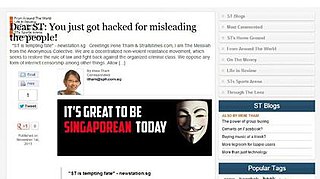 W
WThe 2013 Singapore cyberattacks were a series of cyberattacks initiated by the hacktivist organisation Anonymous, conducted partly in response to web censorship regulations in Singapore. A member of Anonymous, known by the online handle "The Messiah", claimed responsibility for spearheading the attacks. On 12 November 2013, James Raj was charged in a Singapore court as the alleged "Messiah".
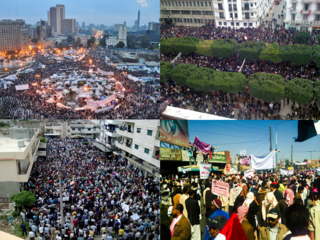 W
WThe Arab Spring was a series of anti-government protests, uprisings, and armed rebellions that spread across much of the Arab world in the early 2010s. It began in response to oppressive regimes and a low standard of living, starting with protests in Tunisia. From Tunisia, the protests then spread to five other countries: Libya, Egypt, Yemen, Syria, and Bahrain, where either the ruler was deposed or major uprisings and social violence occurred including riots, civil wars, or insurgencies. Sustained street demonstrations took place in Morocco, Iraq, Algeria, Iranian Khuzestan, Lebanon, Jordan, Kuwait, Oman, and Sudan. Minor protests took place in Djibouti, Mauritania, Palestine, Saudi Arabia, and the Moroccan-occupied Western Sahara. A major slogan of the demonstrators in the Arab world is ash-shaʻb yurīd isqāṭ an-niẓām.
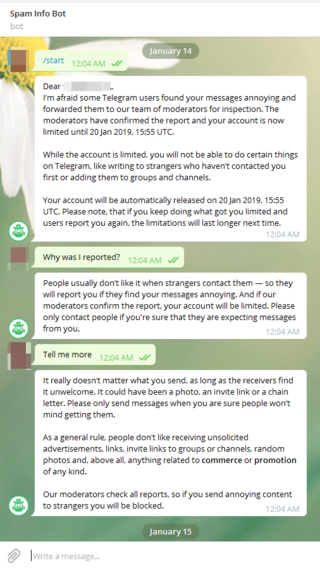 W
WOn the Internet, a block or ban is a technical measure intended to restrict access to information or resources. Blocking and its inverse, unblocking, may be implemented by the owners of computers using software. Some countries, such as China, Iran, India, Russia and Turkey, tend to block access to certain news information that are not directly controlled by state media. In the United States, the Children's Internet Protection Act requires schools receiving federal funded discount rates for Internet access to install filter software that blocks obscene content, pornography, and, where applicable, content "harmful to minors".
 W
WConsent of the Networked: The Worldwide Struggle for Internet Freedom is a book written by Rebecca MacKinnon and released in 2012. It discusses internet censorship and the ways in which companies which manage internet communication are assuming responsibilities formerly held by governments.
 W
WCTB v News Group Newspapers is an English legal case between Manchester United player Ryan Giggs, given the pseudonym CTB, and defendants News Group Newspapers Limited and model Imogen Thomas.
 W
WThe Cybersecurity Information Sharing Act is a United States federal law designed to "improve cybersecurity in the United States through enhanced sharing of information about cybersecurity threats, and for other purposes". The law allows the sharing of Internet traffic information between the U.S. government and technology and manufacturing companies. The bill was introduced in the U.S. Senate on July 10, 2014, and passed in the Senate October 27, 2015. Opponents question CISA's value, believing it will move responsibility from private businesses to the government, thereby increasing vulnerability of personal private information, as well as dispersing personal private information across seven government agencies, including the NSA and local police.
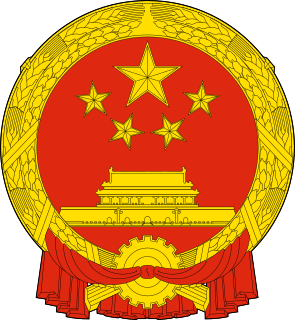 W
WThe Cyberspace Administration of China, also known as the Office of the Central Cyberspace Affairs Commission and the Office of the Central Leading Group for Cyberspace Affairs, is the central Internet regulator, censor, oversight, and control agency for the People's Republic of China.
 W
WDeletionism and inclusionism are opposing philosophies that largely developed within the community of editors of the online encyclopedia Wikipedia. The terms reflect differing opinions on the appropriate scope of the encyclopedia and corresponding tendencies either to delete or to include a given encyclopedia article.
 W
WAlok Dixit is a journalist turned social activist, fighting for freedom of Internet in India. He is the founder member of Save Your Voice, a movement against Internet censorship in India and Stop Acid Attacks, a campaign against acid violence.
 W
WDomain fronting is a technique for internet censorship circumvention that uses different domain names in different communication layers of an HTTPS connection to discreetly connect to a different target domain than is discernable to third parties monitoring the requests and connections.
 W
WA filter bubble – a term coined by internet activist Eli Pariser – is a state of intellectual isolation that can result from personalized searches when a website algorithm selectively guesses what information a user would like to see based on information about the user, such as location, past click-behavior and search history. As a result, users become separated from information that disagrees with their viewpoints, effectively isolating them in their own cultural or ideological bubbles. The choices made by these algorithms are not transparent. Prime examples include Google Personalized Search results and Facebook's personalized news-stream. The bubble effect may have negative implications for civic discourse, according to Pariser, but contrasting views regard the effect as minimal and addressable. The results of the U.S. presidential election in 2016 have been associated with the influence of social media platforms such as Twitter and Facebook, and as a result have called into question the effects of the "filter bubble" phenomenon on user exposure to fake news and echo chambers, spurring new interest in the term, with many concerned that the phenomenon may harm democracy and well-being by making the effects of misinformation worse.(Technology such as social media) “lets you go off with like-minded people, so you're not mixing and sharing and understanding other points of view ... It's super important. It's turned out to be more of a problem than I, or many others, would have expected.”
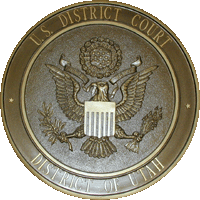 W
WFlorence v. Shurtleff, Civil No. 2:05CV000485, was a case in which the U.S. District Court for the District of Utah issued an order stating that individuals could not be prosecuted for posting adult content that was constitutionally protected on general access websites, nor could they be civilly liable for failing to prevent access to adult content, so long as the material is identifiable by filtering software. The order was the result of a 2005 lawsuit, The King’s English v. Shurtleff, brought by Utah bookstores, artists, Internet Service Providers and the other organizations challenging the constitutionality of certain portions of a Utah Law intended to protect minors from adult content.
 W
WThe Global Network Initiative (GNI) is a non-governmental organization with the dual goals of preventing Internet censorship by authoritarian governments and protecting the Internet privacy rights of individuals. It is sponsored by a coalition of multinational corporations, non-profit organizations, and universities.
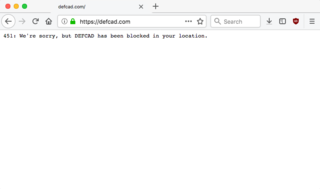 W
WIn computer networking, HTTP 451 Unavailable For Legal Reasons is an error status code of the HTTP protocol to be displayed when the user requests a resource which cannot be served for legal reasons, such as a web page censored by a government. The number 451 is a reference to Ray Bradbury's 1953 dystopian novel Fahrenheit 451, in which books are outlawed. 451 provides more information than HTTP 403, which is often used for the same purpose. This status code is standardized in RFC 7725.
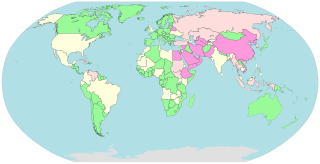 W
WThis list of Internet censorship and surveillance in Africa provides information on the types and levels of Internet censorship and surveillance that is occurring in countries in Africa.
 W
WInternet police is a generic term for police and government agencies, departments and other organizations in charge of policing Internet in a number of countries. The major purposes of Internet police, depending on the state, are fighting cybercrime, as well as censorship and propaganda.
 W
WThe Internet Ungovernance Forum (IUF) is an open forum for dialogue on issues of Internet censorship, freedom of speech, surveillance, privacy and community-centric governance approaches conceived by the Alternative Informatics Association. The first Forum was held in Turkey in September, 2014 and served as model for the organization of the Brazilian and Italian Forums of 2015.
 W
Wirrepressible.info was an anti-Internet censorship campaign and website by Amnesty International and The Observer. It was developed in 2006 by Soda Creative and hosted by Darq Ltd. The site was based in the United Kingdom and open to participation from people around the world.
 W
WJingjing and Chacha are the cartoon mascots of the Internet Surveillance Division of the Public Security Bureau in Shenzhen, People's Republic of China. Debuting on January 22, 2006, they are used to, amongst other things, inform Chinese Internet users what is and is not legal to consult or write on the Chinese Internet. According to the director of the Shenzhen Internet police, "[we published] the image of Internet Police in the form of a cartoon [...] to let all internet users know that the Internet is not a place beyond of law [and that] the Internet Police will maintain order in all online behavior."
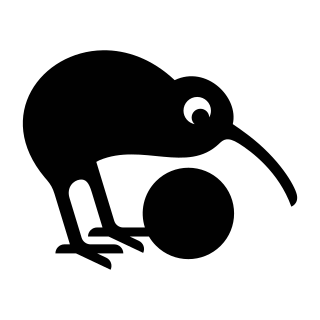 W
WKiwix is a free and open-source offline web browser created by Emmanuel Engelhart and Renaud Gaudin in 2007. It was first launched to allow offline access to Wikipedia, but has since expanded to include other projects from the Wikimedia Foundation as well as public domain texts from Project Gutenberg. Available in more than 100 languages, Kiwix has been included in several high-profile projects, from smuggling operations in North Korea and encyclopedic access in Cuba to Google Impact Challenge's recipient Bibliothèques Sans Frontières.
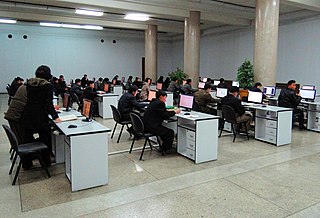 W
WKwangmyong is a North Korean "walled garden" national intranet service opened in 2000.
 W
WLapsiporno.info is a Finnish website opposed to Internet censorship. The website was founded and is maintained by software developer, researcher and Internet activist Matti Nikki, who previously attracted international attention by analyzing Sony BMG's digital rights management rootkit that the company's products automatically installed on users' computers. The website focuses on the internet censorship in Finland, its effectiveness, and the issues and problems related to it.
 W
WMove Your Domain Day is an annual observance encouraging owners of domain names to transfer their domain registration away from registrars that supported the Stop Online Piracy Act (SOPA). It was first held on 29 December 2011, the idea coming from a post on Reddit as a protest against prominent registrar GoDaddy's support for SOPA. In 2012, rival registrar Namecheap began an initiative to make Move Your Domain Day an annual event. Subsequent events were held on 22 January 2013, 5 February 2014, and 27 January 2015. The Electronic Frontier Foundation, Reddit, and domain registrars Name.com and Hover have also participated. Namecheap has defined the initiative as "an annual protest and a commemoration of sorts that will continue to shine a light on the issue of a free and open internet."
 W
WThe Pirate Bay is an online index of digital content of entertainment media and software. Founded in 2003 by Swedish think tank Piratbyrån, The Pirate Bay allows visitors to search, download, and contribute magnet links and torrent files, which facilitate peer-to-peer (P2P) file sharing among users of the BitTorrent protocol.
 W
WThis is a list of countries where at least one internet service provider (ISP) formerly or currently censors the popular file sharing website The Pirate Bay (TPB).
 W
WProject Chanology was a protest movement against the practices of the Church of Scientology by members of Anonymous, a leaderless Internet-based group. The project was started in response to the Church of Scientology's attempts to remove material from a highly publicized interview with Scientologist Tom Cruise from the Internet in January 2008.
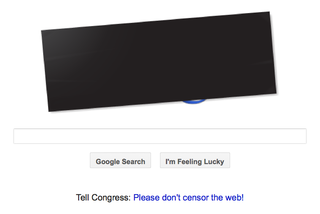 W
WOn January 18, 2012, a series of coordinated protests occurred against two proposed laws in the United States Congress—the Stop Online Piracy Act (SOPA) and the PROTECT IP Act (PIPA). These followed smaller protests in late 2011. Protests were based on concerns that the bills, intended to provide more robust responses to copyright infringement arising outside the United States, contained measures that could possibly infringe online freedom of speech, websites, and Internet communities. Protesters also argued that there were insufficient safeguards in place to protect sites based upon user-generated content.
 W
WPsiphon is a free and open-source Internet censorship circumvention tool that uses a combination of secure communication and obfuscation technologies. Psiphon is a centrally managed and geographically diverse network of thousands of proxy servers, using a performance-oriented, single- and multi-hop architecture.
 W
WThe Scunthorpe problem is the unintentional blocking of websites, e-mails, forum posts or search results by a spam filter or search engine because their text contains a string of letters that appear to have an obscene or otherwise unacceptable meaning. Names, abbreviations, and technical terms are most often cited as being affected by the issue.
 W
WInternet censorship is the control or suppression of what can be accessed, published, or viewed on the Internet enacted by regulators, or on their own initiative. Individuals and organizations may engage in self-censorship for moral, religious, or business reasons, to conform to societal norms, due to intimidation, or out of fear of legal or other consequences.
 W
WVirgin Killer is the fourth studio album by German rock band Scorpions. It was released in 1976 and was the band's first album to attract attention outside Europe. The title is described as being a reference to time as the killer of innocence. The original cover featured a nude prepubescent girl, which stirred controversy in the UK, US and elsewhere. As a result, the album was re-issued with a different cover in some countries.
 W
WVPN blocking is a technique used to block the encrypted protocol tunneling communications methods used by virtual private network (VPN) systems. Often used by large organizations such as national governments or corporations, it can act as a tool for computer security or Internet censorship by preventing the use of VPNs to bypass network firewall systems.
 W
WOn 12 January 2019, the main telecommunications provider in Venezuela, CANTV, issued a block against the online encyclopedia, Wikipedia. All of CANTV's 1.5 million users were affected by the decision. The block was lifted on 18 January 2019, following widespread criticism against the state-owned company, claiming it was in response to the Venezuelan presidential crisis.
 W
WWorld Day Against Cyber Censorship is an online event held each year on March 12 to rally support for a single, unrestricted Internet that is accessible to all and to draw attention to the ways that governments around the world are deterring and censoring free speech online. The day was first observed on 12 March 2008 at the request of Reporters Without Borders and Amnesty International. A letter written by Jean-François Julliard, Secretary-General of Reporters Without Borders, and Larry Cox, Executive Director of Amnesty International, was sent to the Chief Executive Officers of Google, Yahoo!, Inc., and Microsoft Corporation to request observation of the day. The annual event is symbolized by a logo created by Reporters Without Borders consisting of a computer mouse breaking free from a chain.
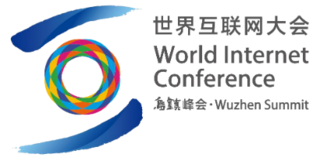 W
WThe World Internet Conference, also known as the Wuzhen Summit, is an annual international event, first held in 2014, organized by government agencies in China to discuss global Internet issues and policies.
 W
WVideo-sharing platform YouTube is the second-most popular website as of August 2019, according to Alexa Internet. According to the company's press page, YouTube has more than one billion users, and each day, those users watch more than one billion hours of video. Censorship of it has occurred and continues to occur to varying degrees in most countries throughout the world.